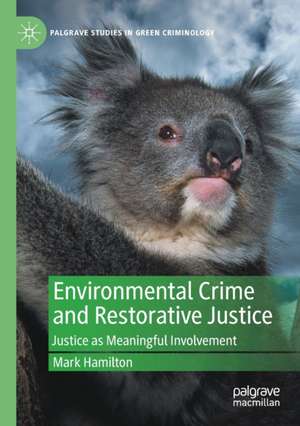Environmental Crime and Restorative Justice: Justice as Meaningful Involvement: Palgrave Studies in Green Criminology
Autor Mark Hamiltonen Limba Engleză Paperback – 4 mar 2022
| Toate formatele și edițiile | Preț | Express |
|---|---|---|
| Paperback (1) | 888.49 lei 6-8 săpt. | |
| Springer International Publishing – 4 mar 2022 | 888.49 lei 6-8 săpt. | |
| Hardback (1) | 892.42 lei 6-8 săpt. | |
| Springer International Publishing – 3 mar 2021 | 892.42 lei 6-8 săpt. |
Din seria Palgrave Studies in Green Criminology
-
 Preț: 319.35 lei
Preț: 319.35 lei -
 Preț: 386.22 lei
Preț: 386.22 lei - 15%
 Preț: 642.18 lei
Preț: 642.18 lei - 18%
 Preț: 782.42 lei
Preț: 782.42 lei - 18%
 Preț: 891.48 lei
Preț: 891.48 lei - 18%
 Preț: 948.79 lei
Preț: 948.79 lei -
 Preț: 451.26 lei
Preț: 451.26 lei - 15%
 Preț: 645.96 lei
Preț: 645.96 lei - 15%
 Preț: 648.24 lei
Preț: 648.24 lei - 18%
 Preț: 894.79 lei
Preț: 894.79 lei - 18%
 Preț: 944.82 lei
Preț: 944.82 lei - 15%
 Preț: 577.72 lei
Preț: 577.72 lei - 15%
 Preț: 637.13 lei
Preț: 637.13 lei - 18%
 Preț: 895.45 lei
Preț: 895.45 lei - 18%
 Preț: 724.00 lei
Preț: 724.00 lei - 18%
 Preț: 949.73 lei
Preț: 949.73 lei - 15%
 Preț: 696.82 lei
Preț: 696.82 lei -
 Preț: 382.75 lei
Preț: 382.75 lei - 18%
 Preț: 945.14 lei
Preț: 945.14 lei
Preț: 888.49 lei
Preț vechi: 1083.53 lei
-18% Nou
Puncte Express: 1333
Preț estimativ în valută:
170.03€ • 184.63$ • 142.83£
170.03€ • 184.63$ • 142.83£
Carte tipărită la comandă
Livrare economică 23 aprilie-07 mai
Preluare comenzi: 021 569.72.76
Specificații
ISBN-13: 9783030690540
ISBN-10: 3030690547
Ilustrații: XIII, 266 p. 3 illus.
Dimensiuni: 148 x 210 mm
Greutate: 0.37 kg
Ediția:1st ed. 2021
Editura: Springer International Publishing
Colecția Palgrave Macmillan
Seria Palgrave Studies in Green Criminology
Locul publicării:Cham, Switzerland
ISBN-10: 3030690547
Ilustrații: XIII, 266 p. 3 illus.
Dimensiuni: 148 x 210 mm
Greutate: 0.37 kg
Ediția:1st ed. 2021
Editura: Springer International Publishing
Colecția Palgrave Macmillan
Seria Palgrave Studies in Green Criminology
Locul publicării:Cham, Switzerland
Cuprins
1.Victims of Environmental Harm.- 2.Prosecution of Environmental Offending.- 3.Justice as Procedure and Justice as Outcome.- 4.Restorative Justice.- 5.Restorative Justice in an Environmental Offending Context: Theory and Practice.- 6.Restorative Justice Conferencing in an Environmental Offending Context: Case Studies.- 7.The Benefits and Limitations of Restorative Justice Conferencing.- 8.Overcoming the Barriers to Restorative Justice Conferencing.- 9.Environmental Victims and Restorative Justice Conferencing.- 10.Justice as Meaningful Involvement and its Operationalisation through Restorative Justice Conferencing.
Notă biografică
Mark Hamilton is a sessional academic at the University of New South Wales, Australia, teaching within the Criminology and Criminal Justice Degree. He has a Master of Environmental Law, Master of Politics and Public Policy, Master of Laws, and PhD in Law. Before undertaking his PhD, he was a solicitor at a law firm in Sydney, practicing in the areas of planning law, environmental law, and the compulsory acquisition of land.
Textul de pe ultima copertă
This book explores the use of restorative justice approaches in the context of environmental crimes. It critically assesses regular criminal justice approaches with regard to green crimes and explores restorative justice conferencing as an alternative. Focussing on justice approaches in Australia and New Zealand, it argues that court processes following environmental offending provide minimal to no offender and victim voice, interaction, and input, rendering them invisible. It proposes a third measure of justice – that of meaningful involvement, beyond that of fair procedure and outcome. It suggests the use of restorative justice conferencing, a facilitated dialogue between stakeholders to crime or conflict, as a vehicle to operationalise and achieve justice as meaningful involvement. This book speaks to those interested in green criminology, victimology and environmental law.
Mark Hamilton is a sessional academicat the University of New South Wales, Australia, teaching within the Criminology and Criminal Justice Degree. He has a Master of Environmental Law, Master of Politics and Public Policy, Master of Laws, and PhD in Law. Before undertaking his PhD, he was a solicitor at a law firm in Sydney, practicing in the areas of planning law, environmental law, and the compulsory acquisition of land.
Caracteristici
Draws on empirical work and provides a new conceptualisation of justice Applies restorative justice models to green crimes Broadens the geographic focus to Australia and New Zealand
